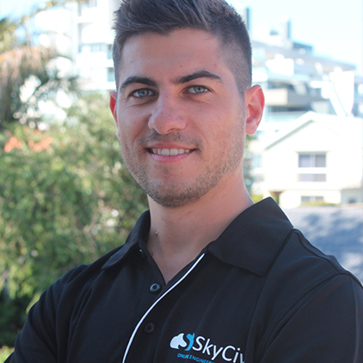Utilizza la scheda tecnica
La scheda tecnica è la tua migliore amica. La scheda tecnica ti consentirà di fare clic e trascinare le stesse informazioni su più righe. Ciò è particolarmente utile se è necessario includere un numero elevato di membri che hanno la stessa sezione, fissazioni o rotazioni. La scheda tecnica consente agli utenti di vedere tutti i dettagli del proprio modello in un formato facile da vedere - consente loro di vedere la posizione di altri nodi/membri mentre modificano quello corrente. Con la scheda tecnica di SkyCiv puoi copiare, modifica ed elimina più righe in pochi secondi.Costruisci in Excel, quindi importare
Questo soprattutto se il tuo modello ha uno schema prestabilito (ad esempio un telaio con campate coerenti). Excel è uno strumento estremamente potente in grado di impostare i nodi (e membri) nella posizione corretta senza che tu debba sederti lì e calcolare la posizione di ogni singolo nodo. È un processo abbastanza semplice. Completa un foglio di calcolo Excel (.csv) con le informazioni richieste per i nodi o i membri. Per i nodi, dovrai fornire quanto segue: Numero di nodo | e Y si riferisce all'asse y | e Y si riferisce all'asse y | Posizione Z. Per i membri, è il numero membro | nodo A | nodo B | Numero di sezione | Rotazione dei membri | Nodo A Fixity | Nodo B Fixity. Una volta completato il foglio di calcolo, è sufficiente fare clic su Dati -> Importa e seleziona ciò che stai importando.Usa le combinazioni di caricamento
Se è necessario testare diverse combinazioni di carico, è meglio applicare prima il carico grezzo e poi aggiungere i fattori del gruppo di carico. È quindi possibile attivare e disattivare questi fattori di combinazione di carico per testare alcuni scenari di caricamento. Ciò ti fa risparmiare tempo poiché non è necessario modificare tutti i diversi carichi distribuiti applicati alla struttura. Cambia semplicemente il fattore di carico e regolerà automaticamente tutti i tuoi carichi in quel particolare gruppo di carico.Usa il peso proprio
SkyCiv ha una funzione integrata, dove puoi attivare e disattivare il peso proprio della struttura. Ciò risparmia agli ingegneri progettisti l'enorme lavoro di applicare la densità del materiale, calcolare manualmente il carico distribuito risultante e quindi applicare questo carico distribuito. Consente agli utenti di attivare o disattivare il peso proprio con il semplice tocco di un interruttore. Ciò è particolarmente utile quando è necessario modificare la sezione da analizzare. Dovresti ricalcolare il nuovo carico distribuito equivalente e apportare le modifiche ai carichi distribuiti applicati. Così il gioco è fatto, sentiti libero di commentare di seguito con eventuali altri suggerimenti su come risparmiare tempo nella costruzione del tuo modello! Ci auguriamo che il tutorial ti sia piaciuto e che tu abbia imparato alcuni trucchi su come costruire modelli più veloci utilizzando il software di progettazione strutturale di SkyCiv.
Sam Carigliano
CEO e co-fondatore di SkyCiv
BEng (Civile), BCom
LinkedIn
CEO e co-fondatore di SkyCiv
BEng (Civile), BCom



